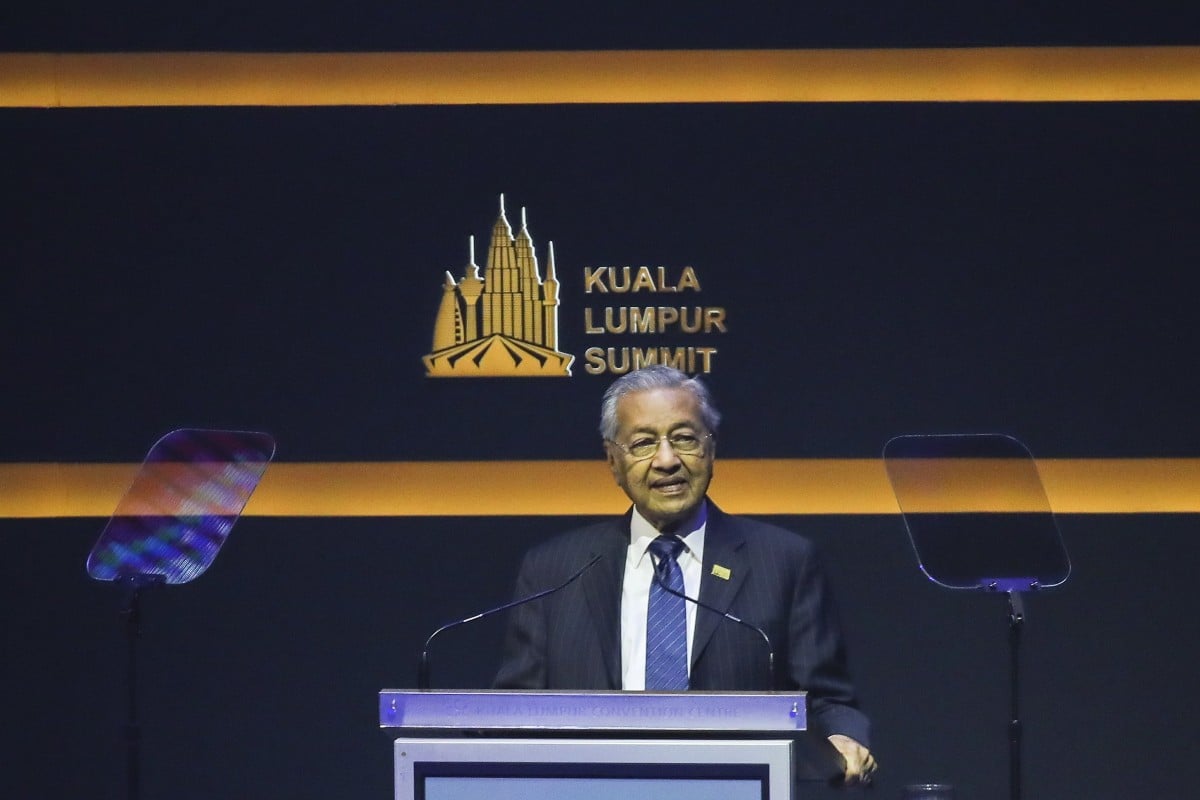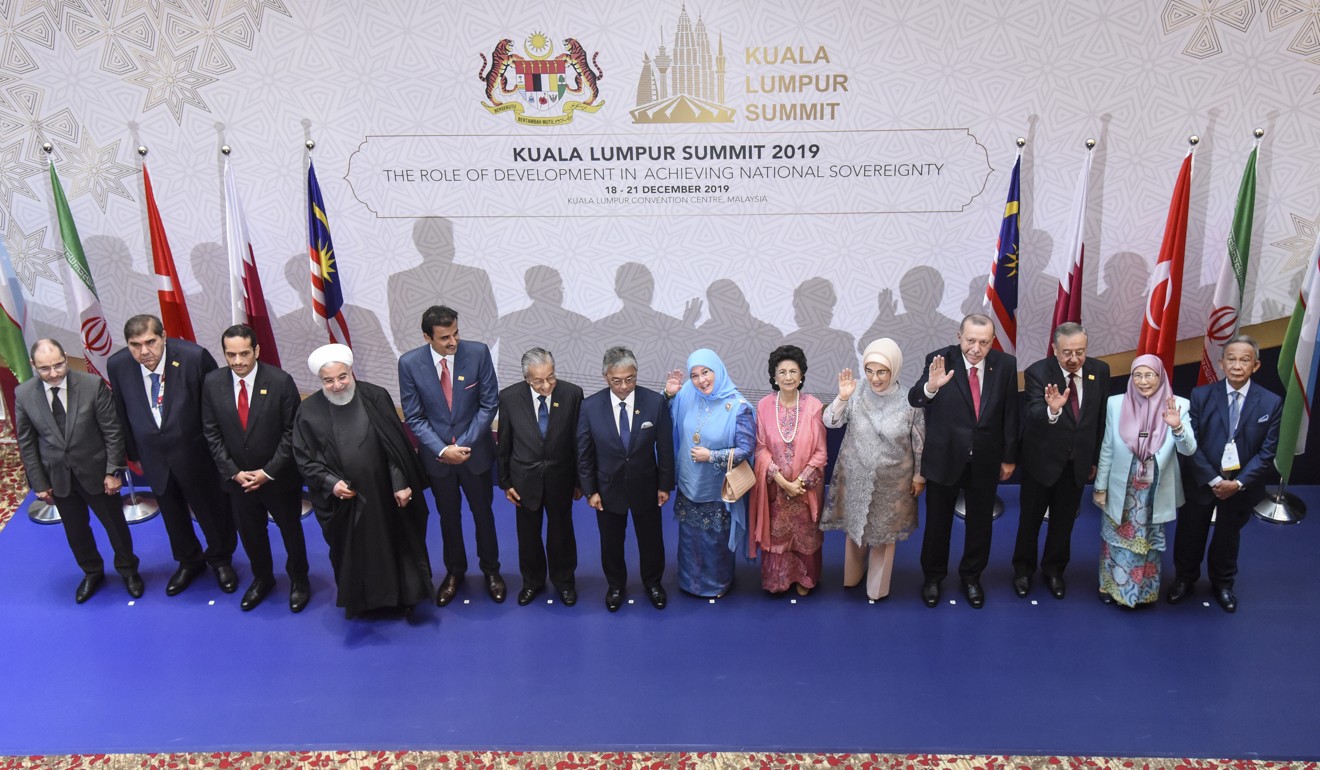Julia Roknifard Published: 24 Dec, 2019 This Week in Asia
- Rohingya crisis, rise of Islamic State, conflict in Kashmir, Chinese treatment of Uygurs and years of bloodshed in Syria and Yemen were largely avoided
- If summit’s aim was to find alternative to Saudi-dominated OIC, it succeeded only in confirming the difficulties Muslim world has dealing with its issues

Malaysian Prime Minister Mahathir Mohamad speaks at the KL Summit 2019. Photo: EPA-EFELast week’s Kuala Lumpur Summit may have been interpreted as an attempt by non-Arab Muslim countries to offer a viable alternative to the Saudi-dominated Organisation of Islamic Cooperation (OIC), even though Malaysian Prime Minister Mahathir Mohamad insisted otherwise.Either way, it was not to be. Although the leaders of Iran, Turkey and Qatar attended, Indonesia’s President Joko Widodo and Pakistan’s Prime Minister Imran Khan were no-shows. Khan was pressured by the Saudis to withdraw from the three-day meeting at the last minute and Widodo’s vice-president Ma’ruf Amin excused himself from the summit due to “exhaustion”.
The summit, to be known as the Perdana Dialogue from next year, was touted as a grand effort to shift narratives for the ummah, to move towards unification of the Muslim world and better address issues of conflict, extremism and oppression. Such concerns remain obstacles to restoring Islam to its “Golden Age”, which ended in the 14th century, when Islamic civilisations flourished, leading the world in commerce, science and culture.So what happened in Kuala Lumpur? Statements were expected to be made regarding the Rohingya crisis in Myanmar, the rise of Islamic State, conflict in Kashmir, Chinese treatment of Uygurs in Xinjiang province and years of bloodshed in Syria and Yemen. However, such statements never materialised. Instead, as if by some unspoken agreement, such issues seemed to be avoided.
China’s PR blitz on Uygurs in Xinjiang sparks anger in Malaysia21 Dec 2019
It was not until two days into the summit the plight of the Rohingya was addressed, when an activist raised the issue during a panel discussion. He was cut off by the moderator, a member of the summit’s steering committee, who insisted the panel on “Advance High-Tech”, discussing innovation and cybersecurity, was not the proper forum for such a discussion.During a separate panel devoted to the “Preservation of National Identity”, a Kashmiri woman sought to discuss India’s policies in the region after the government of Narendra Modi earlier this year revoked the Muslim-majority state’s autonomy, exacerbating tensions with Pakistan.

Delegates at the Kuala Lumpur Summit 2019. Photo: EPA-EFEShe likened the situation in Kashmir to Palestine, where Israel is routinely condemned by Muslim countries as an occupying power. By comparison, India’s policies are less closely scrutinised, she argued, despite the partition in Kashmir occurring in 1947, around the same time Israel was formally created.
The panel, comprised of speakers including ministers, muftis and academics, offered only a muted response.SUBSCRIBE TO This Week in AsiaGet updates direct to your inboxBy registering, you agree to our T&C and Privacy Policy
During a discussion about building the “Muslim economy”, the mufti of the Malaysian state of Perlis Asri Zainul Abidin insisted Muslims should buy goods and services exclusively from other Muslims.
His claim, however, was countered by data gathered by the OIC indicating the Muslim world produces few final products and is better equipped to export raw materials, making a closed loop of trading within the Muslim world unfeasible.
Modi’s surgical strike on Muslims puts India at war with itself17 Dec 2019
Elsewhere, speakers sought to emphasise the divide between the Islamic and Western worlds. In his opening speech, Turkish Prime Minister Recep Tayyip Erdogan said “enemies want to destroy our unity”. Likewise, Algerian politician Abderrazak Makri, also the summit’s secretary general, discussed the role of politics in development and claimed “enemies of Islam wanted to destroy people and it ruined creative potential”.Mahathir, for his part, sought to steer the discussion away from the “good vs evil” dichotomy between the Islamic world and the rest: for example, he praised Turkey for developing its own defence technology while also emphasising China’s value as a trade partner for Muslim countries.Indeed, China was also mentioned during the summit as a role model in its technological self-reliance – although its treatment of the Uygurs did not feature in discussions.
In Myanmar’s Game of Thrones, Suu Kyi’s moral failure laid bare16 Dec 2019
In particular, AI expert Igor Ashmanov highlighted China’s successful transition from manufacturing low-quality copies to its own competitive, authentic products. He also held up Russia as an example of a country that is neither Eastern nor Western, and could therefore offer Muslim nations lessons in technology and cybersecurity sectors.
If the summit’s aim was to lay the foundations for an alternative to the OIC, it succeeded only in demonstrating the difficulties experienced by the Muslim world – insofar as it is a coherent whole rather than a collection of states with their own separate agendas – in addressing its own issues.
Such complications raise further questions about whether religion itself is the most powerful unifying force or whether more pragmatic concerns – such as cooperation on trade and security – might be more effective mechanisms.
Julia Roknifard is an Assistant Professor at the University of Nottingham, Malaysia
